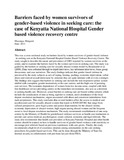| dc.description.abstract | This was a cross-sectional study on barriers faced by women survivors of gender-based violence . in seeking care at the Kenyatta National Hospital Gender Based Violence Recovery Centre. The study sought to describe the nature and prevalence of GBV reported by women survivors at the centre, and to examine the barriers faced by the women survivors in seeking care. The study was guided by the barriers to seeking care for sexually abused women model by Beaulaurier et al. (2008). Data were collected through in-depth interviews, key informant interviews, focus group discussions, and case narratives.
The study findings indicate that gender-based violence is perceived by the study subjects as acts of raping, beating, pushing, economic deprivation, verbal abuse and coerced sexual intercourse by someone they are quite intimate with or even a stranger.
The findings also suggest that barriers to seeking care include the non-responsive police system riddled with corruption, gender insensitivity at the care centres, and the high cost of pursuing care services. The economic dependence of women from low income areas, coupled with little free-healthcare service providing centres in the immediate environment, also acts as a deterrent to seeking health care. Moreover, actual barriers to seeking care are bound within cultures which include the socialization of men as being superior to women, men's dominance of the local dispute resolution mechanisms, stigma associated with abuse and consistent intimidation from male perpetrators.
This study concludes that several barriers affect the access to medical and psychosocial care for sexually abused women that report to KNH GBVRC that range from cultural perspectives, poor legal system and justice dispensations for the abused victims, economic deprivation of abused women, high stigma among abused women and the frequent resort to local dispute resolution mechanism. The study recommends establishment of one-stop-centres by the Ministry of Health for genderbased violence survivors at health care institutions to provide care across medical, psychological, social, cultural, economic and legal referrals.
The study also recommends that health care providers at Kenyatta National.Hospital and other health centres should be trained on how to handle survivors of gender-based violence with sensitivity to encourage peer referrals based on previous experiences with care-givers. Finally, the study recommends a high level of awareness creation among communities on the care-seeking procedures for gender-based survivors. This can be done through the Ministry of State for internal security in collaboration with pro-bono lawyers from FIDA. | en_US |

